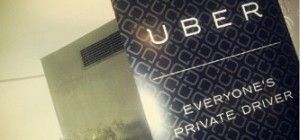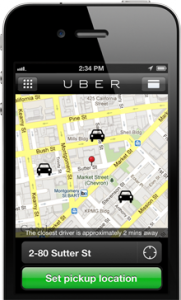Sacramento eyes new Uber regulations
by James Poulos | May 1, 2015 5:00 am
 [1]As the world’s leading driver service faced[2] continued litigation, California lawmakers set out to constrain Uber further. Whereas some previous regulatory efforts were interpreted as attacks on consumer choice, however, one bill now under consideration in Sacramento has promised to increase consumer privacy.
[1]As the world’s leading driver service faced[2] continued litigation, California lawmakers set out to constrain Uber further. Whereas some previous regulatory efforts were interpreted as attacks on consumer choice, however, one bill now under consideration in Sacramento has promised to increase consumer privacy.
Determining data control
Assembly Bill 886, authored by Assemblyman Ed Chau, D-Monterey Park, “would force Uber, Lyft and other ride-hailing companies to follow stricter privacy rules,” the San Francisco Chronicle reported[3]. “AB886 specifies that the smartphone-ordered ride services cannot disclose any data on passengers except to combat fraud or other crimes. It also says the companies must destroy all personal information when customers cancel their accounts.”
Uber has had an easier time pushing back against AB24, a bill focused around ensuring Uber drivers face the same security checks and guarantees as cab and livery drivers. Last year, an early version of the bill, authored by Assemblyman Adrin Nazarian, D-Los Angeles, died in committee, the Chronicle noted. Uber and other rideshare services succeeded in lobbying hard enough to keep it from a vote. But now, the regulatory push has returned. Much like the old, Nazarian’s new bill would[4] “compel ride-hailing companies like Lyft, Uber and Sidecar to obtain fingerprint background checks similar to those used for taxi, limo and bus drivers. It also would require the companies to institute random drug and alcohol testing of drivers, and to receive immediate notifications from the Department of Motor Vehicles when drivers are arrested or convicted for driving under the influence, reckless driving or other serious violations.”
 [5]Uber has restarted its campaign against the would-be measure, but the challenge has come at a difficult time. Litigation driving at the heart of the company’s business has begun to pile up.
[5]Uber has restarted its campaign against the would-be measure, but the challenge has come at a difficult time. Litigation driving at the heart of the company’s business has begun to pile up.
Employees or drivers?
Uber has been drawn deeper into two more rounds of potentially painful litigation. Uber has come under fire not only for denying that its drivers are employees, but for failing to provide adequate services for the blind.
In Douglas O’Connor v. Uber Technologies, Inc., the plaintiffs claimed[6] “that drivers are employees of Uber, as opposed to its independent contractors, and thus are eligible for various statutory protections for employees codified in the California Labor Code § 351.”
“But it also claims that Uber has a requirement under the California Labor Code as an employer to pass on the entire amount of any gratuity ‘that is paid, given to, or left for an employee by a patron.’ The lawsuit not only implies that Uber denied drivers proper wages and reimbursements for driving expenses by misclassifying them as contractors, but also that Uber’s app charges are the 100 percent of tips that are owed to the drivers.”
The ramifications of the suit could be sweeping. Since its creation, Uber’s business model has hinged on its classification of its drivers as non-employees. By avoiding the cost of providing drivers employee benefits, Uber has been able to obtain a multi-billion-dollar valuation and expand at a rapid rate. As Fusion Senior Editor Felix Salmon has observed[7], “just because Uber is making huge amounts of money from its drivers doesn’t mean that it’s ripping them off.” That intuitive argument, however, may not sway the courts.
Driving the blind
Simultaneously, Uber was dealt a separate defeat in litigation over its obligations under federal disability law. As Reuters reported[8], “U.S. Magistrate Judge Nathanael Cousins in San Jose, California, said the plaintiffs could pursue a claim that Uber is a ‘travel service’ subject to potential liability under the Americans with Disabilities Act.”
“The judge rejected Uber’s arguments that the plaintiffs, including the National Federation of the Blind of California, lacked standing to sue under the ADA and state laws protecting the disabled.”
Uber, Reuters noted, has just days to respond.
- [Image]: https://calwatchdog.com/wp-content/uploads/2014/08/Uber.jpg
- faced: http://arstechnica.com/tech-policy/2015/04/21/blind-users-with-service-animals-uber-refuses-to-serve-us/
- reported: http://www.sfgate.com/business/article/California-bill-would-force-Uber-to-guard-6204732.php
- would: http://www.sfgate.com/business/article/Proposed-California-law-would-tighten-Uber-6143708.php
- [Image]: https://calwatchdog.com/wp-content/uploads/2013/10/uber.png
- claimed: http://www.breitbart.com/california/2015/04/16/with-catastrophic-liability-jury-trial-looming-uber-dumps-counsel/
- observed: https://medium.com/@felixsalmon/the-economics-of-everyones-private-driver-464bfd730b38
- reported: http://www.insurancejournal.com/news/west/2015/04/21/365174.htm
Source URL: https://calwatchdog.com/2015/05/01/sacramento-eyes-new-uber-regulations/